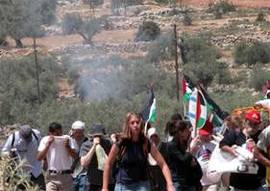Menu


- Gila Svirsky
Three Demonstrations and a Seder

- Photo by activist Vera Reider, fleeing the tear gas
29 April 2005
You had to choose your demonstration carefully during this week of Passover. If you went to the one in Gaza or the northern West Bank, joining right-wing settlers to protest their imminent evacuation, your activities would be secured by Israeli soldiers and border police to protect you from the neighboring Palestinians ‚Äď unarmed and simply waiting for the settlers to depart. If you went to the ultra-Orthodox demonstration against further construction of the new Highway 6 ‚Äď allegedly set down on an ancient burial site ‚Äď you could ‚Äúthrow rocks, bricks, metal rods and benches at the police‚ÄĚ [Ha‚Äôaretz, 28 April 2005] with relative impunity. Yes, some of the ultra-Orthodox were beaten with billy clubs and another 15 were arrested after storming the home of the highway‚Äôs chief engineer, but otherwise it was all in the family.
On the other hand, if you attended yesterday’s demonstration against construction of the Separation Wall at Bil’in, a Palestinian village in the Occupied Territories, you were in for a surprise. Not only were the demonstrators ferociously attacked by Israeli soldiers with stun grenades, tear gas, billy clubs, and bullets, but there were actual provocateurs spread among the demonstrators who deliberately set off the melee by goading the soldiers and hurling rocks at them.
Sound like a scene from an old-fashioned despotic regime? Indeed, and partially acknowledged by the Israeli army: ‚ÄúWe did have agents among the demonstrators, but only to do surveillance of them, and they did not begin the throwing of stones, but joined in to prevent their identities from being revealed‚ÄĚ [TV Channel 10 news, 29 April 2005].
This statement defies logic, ethics, and eyewitness reports, this one from Adi Dagan of the Coalition of Women for Peace:
‚ÄúMany women from the Coalition of Women for Peace, along with activists from Ta‚Äôayush, Gush Shalom, Anarchists Against the Wall and others went to Bil‚Äôin today to participate in a nonviolent demonstration against the wall that had been coordinated in advance with the organizers from the village. We planned to march to the construction site and plant olive trees. As soon as we left the village and walked toward the groves where the construction is taking place, we were met by tear-gas (sniffing onions helps a lot!) and soldiers storming towards us. Suddenly we saw masked people from within the demonstration throwing rocks at the soldiers and then they drew pistols and dragged a demonstrator with them ‚Äď thus it became clear that they were an Israeli undercover unit [mista‚Äôaravim‚Äď Israeli soldiers who disguise themselves as Arab civilians], sent to heat things up and cause provocations. It was just like a movie with the undercover unit playing the Ninjas.‚ÄĚ
The demonstrators, mostly Palestinian villagers and some Israeli peace activists, were all committed to nonviolence and experienced in not giving the army a pretext for opening fire. They were there to plant olive trees. They did not throw stones.
The army’s claim that their undercover agents threw stones to avoid revealing their identity is absurd. First of all, the police code of conduct prohibits such unethical behavior. Secondly, demonstrators can choose their level of involvement, and no one is regarded with suspicion for hanging back from the front line of demonstrators. Clearly, this was a deliberate act of provocation by the army.
And why provoke? This is part of the ongoing Israeli policy of zero tolerance for protest by Palestinians, in an effort to stifle dissent and resistance to the Israeli occupation. And don‚Äôt bother us with arguments about the right to protest; the ‚Äúonly democracy in the Middle East‚ÄĚ stops at the checkpoints into the occupied territories.
And so, as we reach the end of Passover week, with its celebration of the liberation of the Israelites from Egypt thousands of years ago, it’s easy to sink into the myth and ignore reality. Occupation corrupts and brutalizes the occupier, shackling the oppressors to their need to control the oppressed. Let my people go.
Gila Svirsky
Jerusalem
